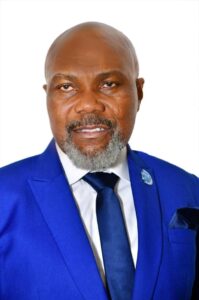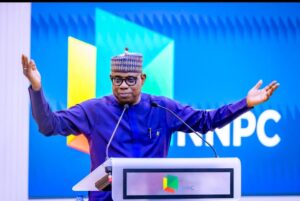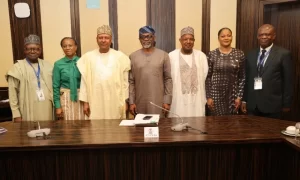

MAKINDE: SETTING THE TEMPLATE FOR NATIONAL ENGAGEMENT -BY SULAIMON OLANREWAJU
Although the penultimate Tuesday’s NLC protest was nationwide, the flavour was different in Oyo State.
Oyo State council of the Nigeria Labour Congress (NLC), in keeping with the directive of its national body, had stormed the streets of Ibadan to protest the excruciating hardship foisted on the people by the twin-policy of subsidy removal and floatation of the naira exchange rate. The procession of workers, which had taken off from the NLC secretariat at Agodi in Ibadan, moved towards the city centre and headed towards Total Garden, where it stopped awhile to address members of the public on why it had embarked on the protest. Different speakers spoke about the hunger and hardship in the country spiced with ‘aluta’ songs to the admiration of onlookers and passers-by.
As the speaking and singing approached a crescendo, there arrived a convoy of vehicles at the scene. Initially, the protesting workers paid no attention to the convoy. However, the protesters were shocked to the marrow when Oyo State governor, Seyi Makinde, alighted from one of the vehicles, full of smiles. The workers were aghast because it was against the run of play for a governor to show up where workers were protesting. A governor showing up at a workers’ protest! It was unprecedented! It was unbelievable! The workers were stunned. As the news traveled round the country, everyone who heard of it was astounded. What manner of Governor will go to a workers’ protest while others stayed away, they must have thought. What kind of Governor is this Seyi Makinde, they must have wondered.
As the reality of the Governor’s presence dawned on the workers, they became jubilant, exhilarant and energized all at the same time. The protesters, who had been rendering songs of lamentation, instantaneously changed to songs of celebration.
The governor walked up to the protesters in measured strides. The people made way for him until he got to the middle of the burgeoning crowd where, after exchanging banter with the NLC leadership in the state, he was handed the microphone.
“E Soleto”, the Governor chanted in identification with the workers.
“E the workers”, the protesters responded.
The Governor then set the tone for the engagement. He told the workers that they had an inalienable right to protest but cautioned them against going overboard so as not to endanger the peace of the state. He added that he had come to identify with them as a citizen of Nigeria with an understanding of the challenges of the times. He acknowledged that there was hunger in the land, which had made life difficult for many people and had brewed anger in them. While noting that reforms would always come with challenges, the Governor added that the country had enough capacity to surmount the challenges if everyone would pull in the same direction.
He said, “It is not the time for divisive activities. We have to pull together and confront the challenges that we are faced with.”
Makinde then told the protesters what his government had done to improve the lot of workers in the state, such as prompt payment of salaries, provision of free buses and payment of wage award to all categories of workers and pensioners pending the resolution of the minimum wage issue. The Governor urged the workers to go beyond agitation and remonstration to reflecting on the challenges the country is faced with and task their intellect to come up with solutions, adding that they should bring same to him for discussion. He then assured the protesting workers that the letter which they had given to him for transmission to the president would be delivered to The Villa.
There was no blame trading, no name calling, no finger pointing and no buck passing. Makinde’s communication to the workers was not just to inform the protesters but to transform the people.
What Governor Seyi Makinde demonstrated that Tuesday morning is empathetic leadership.
Empathetic leadership is characterized by a genuine interest in the wellbeing of the led. It is the leader putting himself in the shoes of those he leads. It is the leader making the concerns of the led his own concerns and making their worries his worries. It is bridging the gap between the leader and the led. It is showing understanding that though the leader and the led function from different sides of the divide; they both have the same mission, which is the overall good of the people and total development of the society. Empathy, which is being cognizant of others’ feelings, is the hallmark of great leadership.
Every empathetic leader realizes the need to connect with those he leads. He does not relate to them as statistical figures or inconsequential parts of the system, rather he treats them with utmost dignity by paying attention to them. He does not underrate anybody nor does he underplay any issue. No matter how pressed he is for time, when issues affecting those he leads arise, he drops everything and gives the issues his whole attention. Even if he cannot immediately proffer a solution to the issues, he makes the moment count with his words and time. Empathetic leaders give their ears to those they lead and by so doing win the hearts of the people. Empathetic leaders provide shoulders for others to lean on, and consequently win their hands.
When a leader pays attention to his people, he wins their loyalty, respect and admiration. Empathetic leaders make everyone who comes into their presence leave with a spring in their steps. As observed by Maya Angelou, people may not remember what you said, they may even forget what you did, but they will never forget how you made them feel.
By going to meet the protesters and not waiting for them to come to him, Governor Makinde made the workers’ day because he gave them the attention they desired and the respect they deserved. He identified with them and showed that their concerns were his concerns.
As a result of going to the protesters Makinde achieved three things. One, he identified with the aspiration of the people. No leader can solve the problem he does not understand. The first condition to understanding the problems of a people is identifying with their aspiration.
Then, as the state’s Chief Security Officer, he ensured that the protest did not get out of hand. Anyone who understands the mob spirit knows that even a peaceful protest is a potential chaos. The best way to deal with it is to nip it in the bud. So, by going out to meet the people, addressing their issues and assuring them of communicating their concerns to the presidency, the mission of the protesters had been accomplished. Thus, the protesters did not need to spend too much time on the streets before calling it a day.
Finally, going out to meet the protesters strengthened the bond between the people and the government. The Governor’s presence reassured the workers that there was no enmity between the state government and the workers.
In Nigeria, the leaders and the led see differently and operate on different wavelengths. Rather than work together as collaborators, they are always pitted against each other. This is one of the factors breeding distrust between the government and the people. Building a virile nation and a great economy cannot be achieved when components of the society find it difficult to cooperate.
Nation building is not a tug of war between the leaders and the led, but a pulling together in the same direction. Great societies are the outcome of collaboration between the leaders and the people, but development is stalled when leaders and the led pull in different directions.
However, having the leaders and the led pulling in the same direction is not a given; it can only happen at the instance of the leaders. This is why leaders are regarded as change agents. It is what they want in their societies that happen. This is exactly what Makinde demonstrated last week when he showed up at the workers’ protest.
Makinde’s message to the whole nation by going to meet Oyo State protesters is that deploying old strategies cannot produce new results; national problems cannot be overcome by being evasive and offensive but by being open to negotiation and ensuring that both the leaders and the led pull in the same direction.
Olanrewaju is the Chief Press Secretary to Governor Seyi Makinde.






